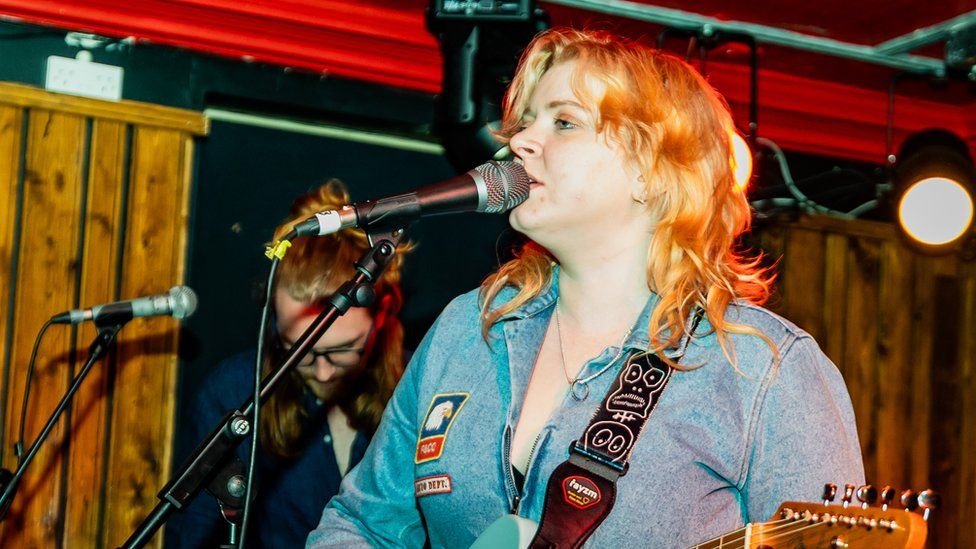Sprints singer: 'I should be able to perform without being groped'
- Published

A singer says the response to her calling out sexual assaults at gigs has opened her eyes to the scale of the problem.
Karla Chubb, from Irish punk band Sprints, put a statement online saying she'd been groped by an audience member during a Belfast show on Saturday.
Their post sparked a huge reaction, with acts across the UK and USA sharing their own stories in response.
It comes as a group of UK MPs prepares to meet to discuss misogyny in music.
Karla says her chest was groped during the band's gig at Ulster Sports Club - the second time she'd been assaulted during their debut album tour.
"I should be able to get off the stage at my own show without fear of being groped," she says.
Speaking to BBC Newsbeat Karla says she realised she "didn't make it up" and "wasn't being dramatic" after fans pointed out what happened.
"I think any woman who's experienced any kind of assault or harassment is almost like... are people gonna think I've had one too many drinks, and I've made it up?" she says.
"Or maybe I'm just exaggerating, or he didn't mean it, or whatever.
"But I was really annoyed by it."
'Terrifyingly uniform experience'
Karla says she was hesitant about releasing the band's statement but going public has highlighted a wider issue. She waived a legal right to anonymity under sexual assault laws to speak to BBC Newsbeat.
"Thankfully the response has been 99%, incredibly, overwhelmingly positive," she says. "And also, terrifyingly, a uniform experience, I think, for a lot of female performers."
She says lots of artists have been in touch to share their stories and show support.
"A tonne of acts have reached out from across the UK to the US, like I'm not going to name the names as a lot of them messaged in private.
"But there's a lot of people coming forward. A lot of male acts, our labelmates obviously, everyone's standing up and people we've worked with are definitely showing solidarity."
The Police Service of Northern Ireland (PSNI) told BBC Newsbeat they were investigating a report of sexual assault at a bar in the High Street area of Belfast on Saturday.
However, they said on Wednesday that the case had been closed after "officers conducted a number of inquiries", adding that "no complaint was made".
Misogyny in the music industry is a problem that's received the attention of the UK government.
In January, the Women and Equalities Committee (WEC) - a group of MPs from different parties who advise the government on a specific issue - released a report on the topic.
The findings, based on an inquiry which started in 2022, warned that the industry was a "boys' club" with a "culture of silence" surrounding abuse.
Giving evidence at a public hearing, former Radio 1 DJ Annie Mac, said there was a "tidal wave" of revelations about sexual assault in the music industry waiting to be told.
The WEC is due to meet again later to discuss the government's response and says it "failed to accept" a set of "wide-ranging recommendations" designed to better protect women in the industry.
Committee chairwoman, Conservative MP Caroline Nokes, tells Newsbeat she isn't "remotely surprised" by Karla's story.
"My message to the government is you need to get serious about the safety of women," she says.
"You need to make sure that they are safe wherever they are in work or when they're freelancers, when they're self-employed, when they're working late at night.
"It shouldn't matter - they need to be safe."
Ms Nokes says the committee wants the government to "outlaw" non-disclosure agreements in cases of sexual abuse and sexual harassment.
Often called NDAs, these legal documents work in a similar way to contracts and signing one means someone agrees not to speak in public about something.
Some people believe they're used by people in positions of power to cover-up wrongdoing.
Ms Nokes says NDAs have been banned in higher education but not in other sectors.
"So I will continue to pursue ministers over this because what our report did is gave confidence to other women to speak out," she says.
"People like Karla who might have previously been silent, we need to support them, and we need to see that there's change."
The government told BBC Newsbeat: "All women should be able to work free from misogyny and discrimination. Government has provided robust legal protections for workers to ensure this as well as committing to further legislation to tackle the abuse of NDAs.
"We carefully considered the Women and Equalities Committee's recommendations and in our response have made clear that the music industry must do all it can to address power imbalances and ensure its workplaces are safe and supportive environments for all."
Related Topics
- Published30 January